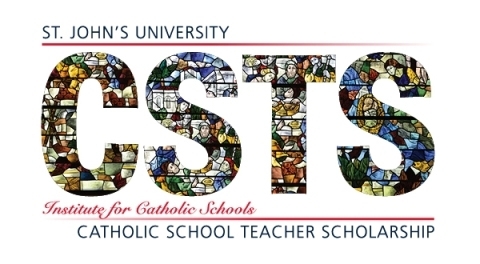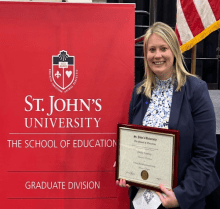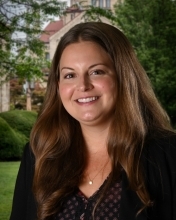Institute for Catholic Schools
What We Do
Founded in 2009, the Institute of Catholic Schools (ICS) works with local dioceses and private individuals to provide the resources necessary to expand programs and sustain excellence in Catholic education long term. The Institute is an active member and participant in Catholic Higher Education Supporting Catholic Schools (CHESCS) under the auspices of the National Catholic Educational Association (NCEA). We welcome the opportunity for new partnerships to develop and foster Catholic education initiatives.
Mission Statement
The mission of the Institute for Catholic Schools is to foster long-term sustainability and the growth and excellence of Catholic education. ICS assists the local dioceses in cultivating and perpetuating the charism of Catholic schools and works to develop a conduit for Catholic school educators to enhance the administrative and academic infrastructure of schools.
ICS Scholarship Opportunities
Future Catholic School Teacher Scholarship
The Future Catholic School Teacher Scholarship is designed to support undergraduate students who are committed to pursuing a teaching career in the Diocese of Brooklyn. This funding provides a $10,000 scholarship ($2,500 per year) for four years of undergraduate study. This scholarship is available exclusively to undergraduate students planning to teach in the Diocese of Brooklyn. The opportunity requires enrollment in a teacher preparation program in the School of Education at St. John’s University. This scholarship can be combined with other financial aid awards and Catholic Scholars program funding.
Catholic School Teacher Scholarship
The Catholic School Teacher Scholarship (CSTS) has a twofold objective. The first is to support the academic excellence of Catholic schools by educating and retaining well-trained professionals. The second is to assist those who have chosen to work in Catholic schools as teachers or administrators with a more affordable means to pursue graduate degrees or advanced certificates.
The Catholic School Teacher Scholarship (CSTS) provides full-time Catholic school teachers and administrators to study at St. John's University School of Education for an MS or Advanced Certificate at significant savings. Recipients may use this scholarship for any program within the School of Education at St. John’s University. It offers an affordable way to pursue a graduate degree for initial NYS certification or to move into a different aspect of education, such as school administration, counseling, or special education, just to name a few.
This scholarship is intended for those educators who are currently working as full-time teachers or administrators in a Catholic School within the Archdiocese of New York, the Diocese of Brooklyn, or the Diocese of Rockville Centre. Upon acceptance to the School of Education at St. John’s University, these students will matriculate in a graduate degree or advanced certificate program. This scholarship is offered in addition to the Catholic School Educator Discount offered by St. John’s University to educators currently employed in Catholic schools.
The savings realized by the ICS CSTS and the Catholic School Educator Discount result in an out-of-pocket tuition cost that is lower than CUNY tuition. The agreement represents a mutual understanding of the policies and requirements of the ICS Catholic School Teacher Scholarship for Advanced Degrees. The ICS Catholic School Teacher Scholarship covers 30% of the tuition for a program of up to thirty-six credits taken over six semesters, two courses per semester.
More Information
- Application and acceptance into a program of study for a graduate degree or advanced certificate program in the School of Education at St. John’s University.
- Commit to remain working full-time as a teacher or administrator in a Catholic School within the Archdiocese of New York, the Diocese of Brooklyn, or the Diocese of Rockville Centre, as a teacher or administrator, for the entire course of the program of study. (Leaving the employment in Catholic schools will result in the forfeiture of the ICS CSTS and students would then be billed for that portion of the tuition. The continuance of the Catholic School Educator Discount offered by the University will also be impacted.)
- Register as a matriculated student in a MS program or advanced certificate program after two courses. (Failure to comply with full matriculation after two courses will result in the forfeiture of the ICS CSTS.)
- Courses may be taken during the regular semesters as well as the summer semester as long as they fulfill the program requirements.
- Maintain a 3.0 cumulative GPA each semester.
- Submit annually the requisite paperwork to the Office of Student Financial Services and the Institute for Catholic Schools.
- Meet with the ICS Director each semester to discuss and evaluate program progress.
- Adhere to all Student Code of Conduct and University policies of St. John’s University.
Application Packet
Applicants for the ICS CSTS must identify as Roman Catholic and submit the application packet that includes documentation of Baptism, Confirmation and Communion
Essay
The typed essay of approximately 500 – 700 words should address the following questions: Why is being a Catholic school teacher or administrator your vocation? How does your faith inspire and influence your pedagogical decisions and the classroom environment you create?
Documentation
- Proof of current full-time employment as a teacher or administrator in a Catholic School within the Archdiocese of New York, the Diocese of Brooklyn, or the Diocese of Rockville Centre
- Copies of NYS certification status or progress toward NYS certification
Letters of Recommendation
Applicants to the ICS Catholic School Teacher Scholarship are required to have two letters of recommendation submitted in support of their application for the scholarship. One must come from the school principal who can speak to the applicant’s work ethic, length of time working as a Catholic school teacher, commitment to Catholic education, and why this applicant’s course of study would be of benefit to the school community. If the applicant is a principal, the recommendation attesting to the above must be from the Education Office of the Diocese in which the principal is employed. The other letter should come from a faith leader and/or educator who can speak to the applicant’s faith, integrity, leadership, and academics.
All information should be sent to the Director of ICS via email, to Robert DiNardo at [email protected]. If you have questions, or require additional information, please contact the Director of ICS, Robert DiNardo, via email at [email protected].
- Catholic School Teacher Scholarship Recipients Recognized
- Institute for Catholic Schools Hosts Successful Workshop for Catholic Educators
- Introducing the Future Catholic Teacher Scholarship Program
- Institute for Catholic Schools Celebrates New School Year at Mass and Luncheon
- Meeting Focuses on Catholic Education
CSTS Success Stories
Emily Conboy
Emily Conboy is a fifth and sixth grade teacher at Our Lady of Victory School in Floral Park, NY. She has been at OLV since 2017. She received her Bachelor of Arts in English from James Madison University in Harrisonburg, Virginia and her MSEd in Early Childhood and Childhood Education from Hofstra University. When she decided to return to school to pursue studies in Administration, she was encouraged by her building principal to apply to The School of Education at St. John’s University. She will complete her studies and receive her Advanced Certificate in School Building Leadership in May of 2023.
Christine E. Glynn
Christine E. Glynn from Babylon, NY is now serving as the Principal of St. Patrick School in Bay Shore. Prior to her principalship Christine taught Religious Education at St. Francis Preparatory School in Fresh Meadows, Queens since 2018. As a faculty member at SFP Christine filled many facets of the school as the Franciscan Youth Coordinator and Yearbook Adviser. She was brought to teaching after receiving her BA in Theology & Religious Studies from The Catholic University of America. She has also received a Masters of Arts degree in Historical Theology and Masters of Science in School Building Leadership from St. John’s University. Her studies began at St. Mary’s in East Islip as a child and were enriched by her high school years at St. John the Baptist in West Islip. Christine’s leadership is grounded in her faith and driven by her dedication to enriching the lives of her students. She is passionate about her Franciscan values, missionary work, and family unity.



